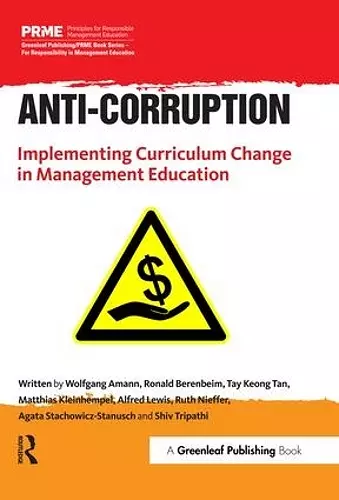Anti-Corruption
Implementing Curriculum Change in Management Education
Wolfgang Amann author Shiv Tripathi author Agata Stachowicz-Stanusch author Alfred Lewis author Tay Keong Tan author Ronald Berenbeim author Matthias Kleinhempel author Ruth Nieffer author
Format:Paperback
Publisher:Taylor & Francis Ltd
Published:15th Sep '15
Currently unavailable, and unfortunately no date known when it will be back
This paperback is available in another edition too:
- Hardback£145.00(9781783534739)

Successful businesses are built on trust. Employees and colleagues need to trust one another and they need to deserve and receive trust from customers and suppliers. Anti-Corruption provides resources for building trust through the implementation of comprehensive guidelines on how to professionalize ethics and anti-corruption education worldwide in a variety of classroom settings. It is written and tested by highly experienced program directors, deans and professors, in how to adopt, adapt and develop best teaching practice. It highlights successful patterns, details illustrative case studies and offers clear, hands-on recommendations.
Anti-Corruption enables business schools, management-related academic institutions, and Executive Training Programs to embed curriculum change quickly to achieve positive outcomes. It enables degree programs and executive education programs to achieve global standards that will be widely followed.
Is there a need for an anti-corruption curriculum in management education? How can guidelines for ethics and anti-corruption education be implemented in various classroom settings, ranging from undergraduate to executive education programmes? Answers to these questions can be found in the new Greenleaf Publication Anti-Corruption: Implementing Curriculum Change in Management Education in the UN PRME Series on responsible management education. It examines the ideas of the Principle Management Education (PRME) Working Group on Anti-Corruption which aims to promote ethically and socially responsible management education and effective learning experiences for responsible leadership. Their key values and principles are summarized in an anti-corruption toolkit. This toolkit represents a teaching resource collecting pilot projects, progress reports, best practices and sample material forimplementation in curriculums of business schools. The main goal is to make available a modern anti-corruption curriculum and to ensure ongoing improvement in the field. Written by a leading team of experts from the PRME Working Group, the book presents sample curricula, illustrative case studies and offers clear, hands-on recommendations. Anti-corruption education plays an important role in today’s fight against corruption. Because corruption is seen as inevitable in many countries, it is important to underscore the fact that corruption can be combatted through strengthening public awareness and participation. By promoting key values and attitudes that resist illegal behaviors, anti-corruption education empowers local actors to actively tackle corruption. The book, which was published in September 2015, underlines the importance of anti-corruption education for future generation of leaders and managers. Finally, it emphasizes possible benefits like capacity-building processes, rising awareness for integrity, and increasing compliance standards. The PRME’s anti-corruption toolkit can be accessed via the following link: http://actoolkit.unprme.org/ -- Muriel Poisson, UNESCO IIEP * https://eticoblog.wordpress.com/2015/11/13/anti-corruption-implementing-curriculum-change-in-managem *
ISBN: 9781783535101
Dimensions: unknown
Weight: 204g
162 pages